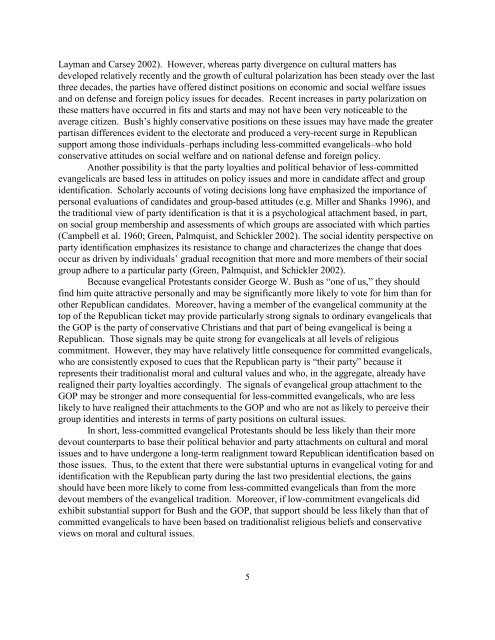George W Bush and the Evangelicals
George W. Bush and the Evangelicals: - Rooney Center - University ...
George W. Bush and the Evangelicals: - Rooney Center - University ...
- No tags were found...
You also want an ePaper? Increase the reach of your titles
YUMPU automatically turns print PDFs into web optimized ePapers that Google loves.
Layman <strong>and</strong> Carsey 2002). However, whereas party divergence on cultural matters has<br />
developed relatively recently <strong>and</strong> <strong>the</strong> growth of cultural polarization has been steady over <strong>the</strong> last<br />
three decades, <strong>the</strong> parties have offered distinct positions on economic <strong>and</strong> social welfare issues<br />
<strong>and</strong> on defense <strong>and</strong> foreign policy issues for decades. Recent increases in party polarization on<br />
<strong>the</strong>se matters have occurred in fits <strong>and</strong> starts <strong>and</strong> may not have been very noticeable to <strong>the</strong><br />
average citizen. <strong>Bush</strong>’s highly conservative positions on <strong>the</strong>se issues may have made <strong>the</strong> greater<br />
partisan differences evident to <strong>the</strong> electorate <strong>and</strong> produced a very-recent surge in Republican<br />
support among those individuals–perhaps including less-committed evangelicals–who hold<br />
conservative attitudes on social welfare <strong>and</strong> on national defense <strong>and</strong> foreign policy.<br />
Ano<strong>the</strong>r possibility is that <strong>the</strong> party loyalties <strong>and</strong> political behavior of less-committed<br />
evangelicals are based less in attitudes on policy issues <strong>and</strong> more in c<strong>and</strong>idate affect <strong>and</strong> group<br />
identification. Scholarly accounts of voting decisions long have emphasized <strong>the</strong> importance of<br />
personal evaluations of c<strong>and</strong>idates <strong>and</strong> group-based attitudes (e.g. Miller <strong>and</strong> Shanks 1996), <strong>and</strong><br />
<strong>the</strong> traditional view of party identification is that it is a psychological attachment based, in part,<br />
on social group membership <strong>and</strong> assessments of which groups are associated with which parties<br />
(Campbell et al. 1960; Green, Palmquist, <strong>and</strong> Schickler 2002). The social identity perspective on<br />
party identification emphasizes its resistance to change <strong>and</strong> characterizes <strong>the</strong> change that does<br />
occur as driven by individuals’ gradual recognition that more <strong>and</strong> more members of <strong>the</strong>ir social<br />
group adhere to a particular party (Green, Palmquist, <strong>and</strong> Schickler 2002).<br />
Because evangelical Protestants consider <strong>George</strong> W. <strong>Bush</strong> as “one of us,” <strong>the</strong>y should<br />
find him quite attractive personally <strong>and</strong> may be significantly more likely to vote for him than for<br />
o<strong>the</strong>r Republican c<strong>and</strong>idates. Moreover, having a member of <strong>the</strong> evangelical community at <strong>the</strong><br />
top of <strong>the</strong> Republican ticket may provide particularly strong signals to ordinary evangelicals that<br />
<strong>the</strong> GOP is <strong>the</strong> party of conservative Christians <strong>and</strong> that part of being evangelical is being a<br />
Republican. Those signals may be quite strong for evangelicals at all levels of religious<br />
commitment. However, <strong>the</strong>y may have relatively little consequence for committed evangelicals,<br />
who are consistently exposed to cues that <strong>the</strong> Republican party is “<strong>the</strong>ir party” because it<br />
represents <strong>the</strong>ir traditionalist moral <strong>and</strong> cultural values <strong>and</strong> who, in <strong>the</strong> aggregate, already have<br />
realigned <strong>the</strong>ir party loyalties accordingly. The signals of evangelical group attachment to <strong>the</strong><br />
GOP may be stronger <strong>and</strong> more consequential for less-committed evangelicals, who are less<br />
likely to have realigned <strong>the</strong>ir attachments to <strong>the</strong> GOP <strong>and</strong> who are not as likely to perceive <strong>the</strong>ir<br />
group identities <strong>and</strong> interests in terms of party positions on cultural issues.<br />
In short, less-committed evangelical Protestants should be less likely than <strong>the</strong>ir more<br />
devout counterparts to base <strong>the</strong>ir political behavior <strong>and</strong> party attachments on cultural <strong>and</strong> moral<br />
issues <strong>and</strong> to have undergone a long-term realignment toward Republican identification based on<br />
those issues. Thus, to <strong>the</strong> extent that <strong>the</strong>re were substantial upturns in evangelical voting for <strong>and</strong><br />
identification with <strong>the</strong> Republican party during <strong>the</strong> last two presidential elections, <strong>the</strong> gains<br />
should have been more likely to come from less-committed evangelicals than from <strong>the</strong> more<br />
devout members of <strong>the</strong> evangelical tradition. Moreover, if low-commitment evangelicals did<br />
exhibit substantial support for <strong>Bush</strong> <strong>and</strong> <strong>the</strong> GOP, that support should be less likely than that of<br />
committed evangelicals to have been based on traditionalist religious beliefs <strong>and</strong> conservative<br />
views on moral <strong>and</strong> cultural issues.<br />
5


